Abstract
Plasma levels of circulating carcinoembryonic antigen (CEA) were measured by zirconyl phosphate gel radioimmunoassay in 112 patients with chronic inflammatory bowel disease. The levels were then related to category, extent, duration, and severity of disease, as well as to the ages and surgical status of the patients. The distribution of CEA levels and their mean values were significantly raised over the levels in 33 normal control subjects, and were similar among patients with ulcerative colitis compared with those with granulomatous bowel disease. Positive values were defined as those in excess of 2·5 ng/ml. Positive assays occurred in 42% of ulcerative colitis patients, in 38% of Crohn's disease patients, and in 40% of the total group with inflammatory bowel disease. Among normal control subjects, only 3% were positive. Among inflammatory bowel disease patients, positive CEA assays occurred more frequently with more severe disease, more extensive anatomical involvement, younger ages, and shorter duration of disease. Those patients who had undergone total colectomy showed levels of circulating CEA and frequency of CEA positivity similar to those of an age-matched normal control group. Levels of CEA did not correspond with known cancer risk factors in patients with inflammatory bowel disease. Although rising or persisting plasma CEA values unrelated to severity and extent of disease may indicate an unfavourable prognosis in cancer, this study shows that a single CEA value in patients with chronic inflammatory bowel disease is not a reliable indicator of cancer risk.
Full text
PDF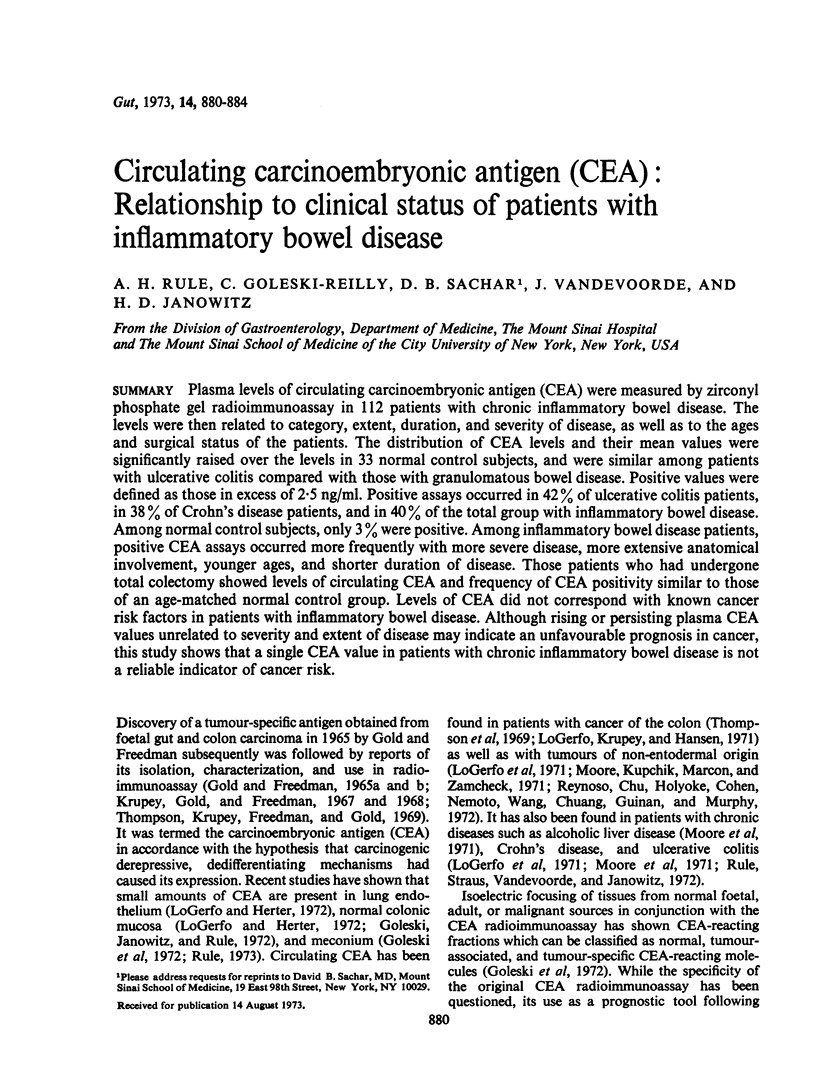
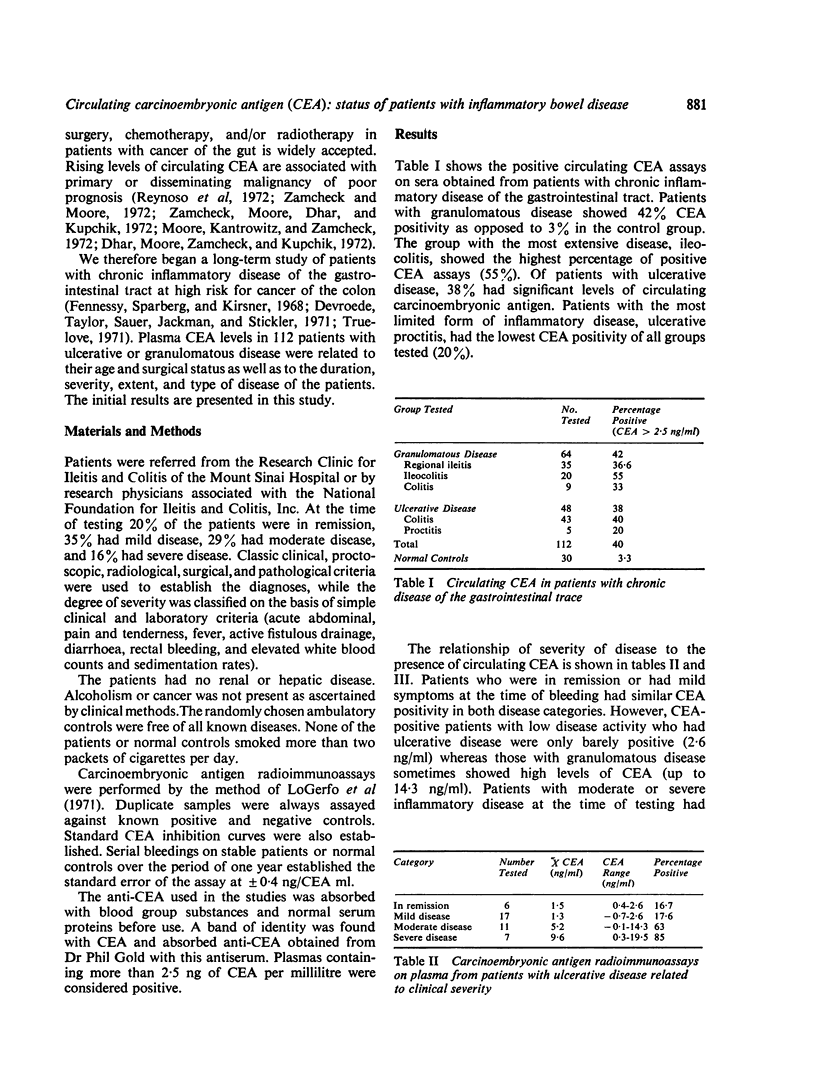
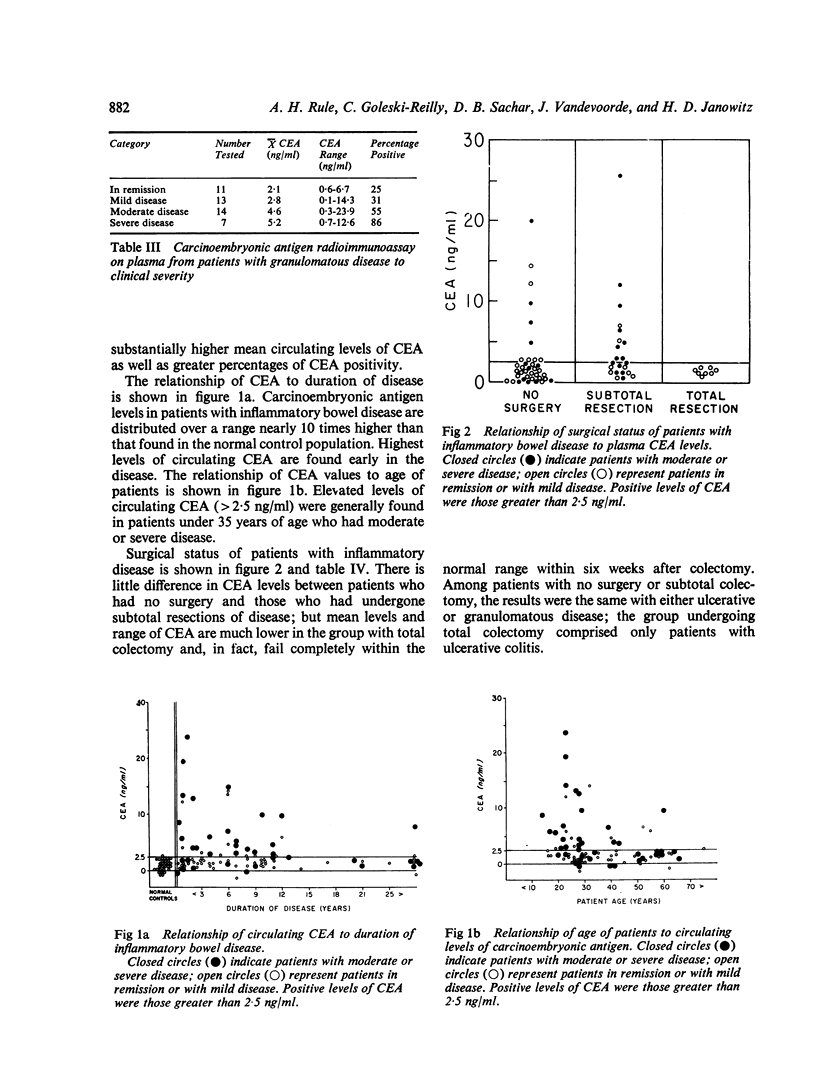
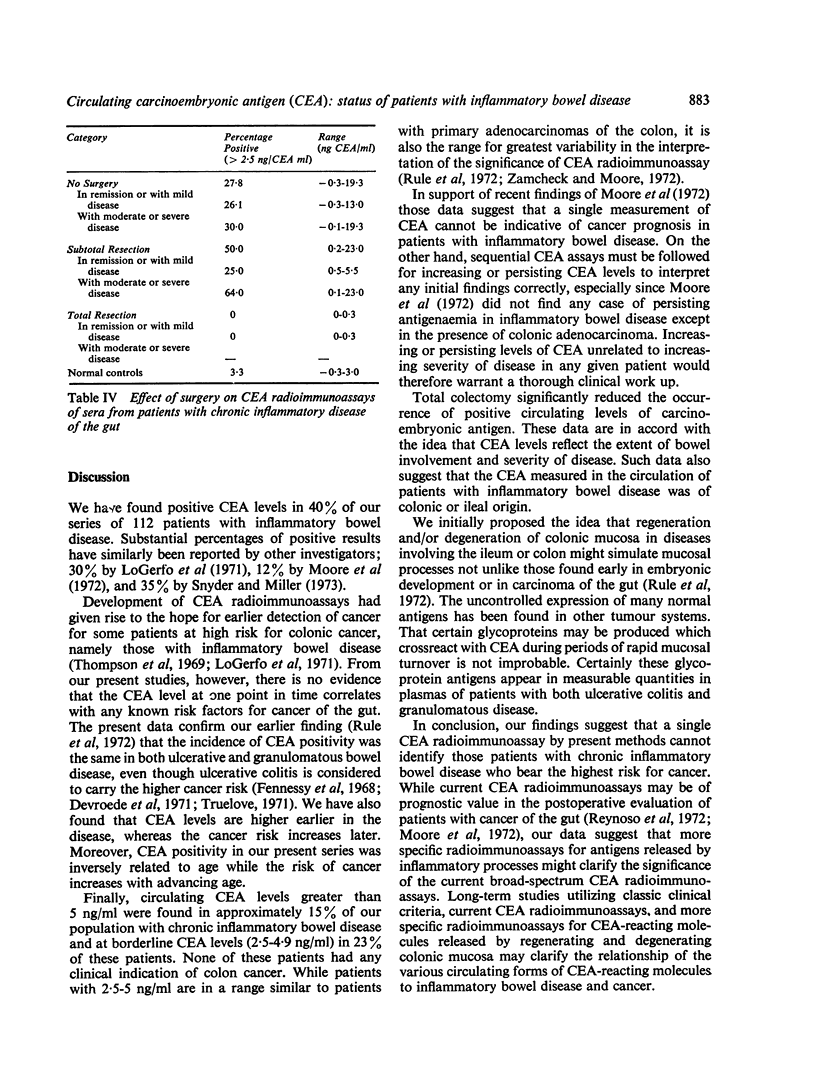
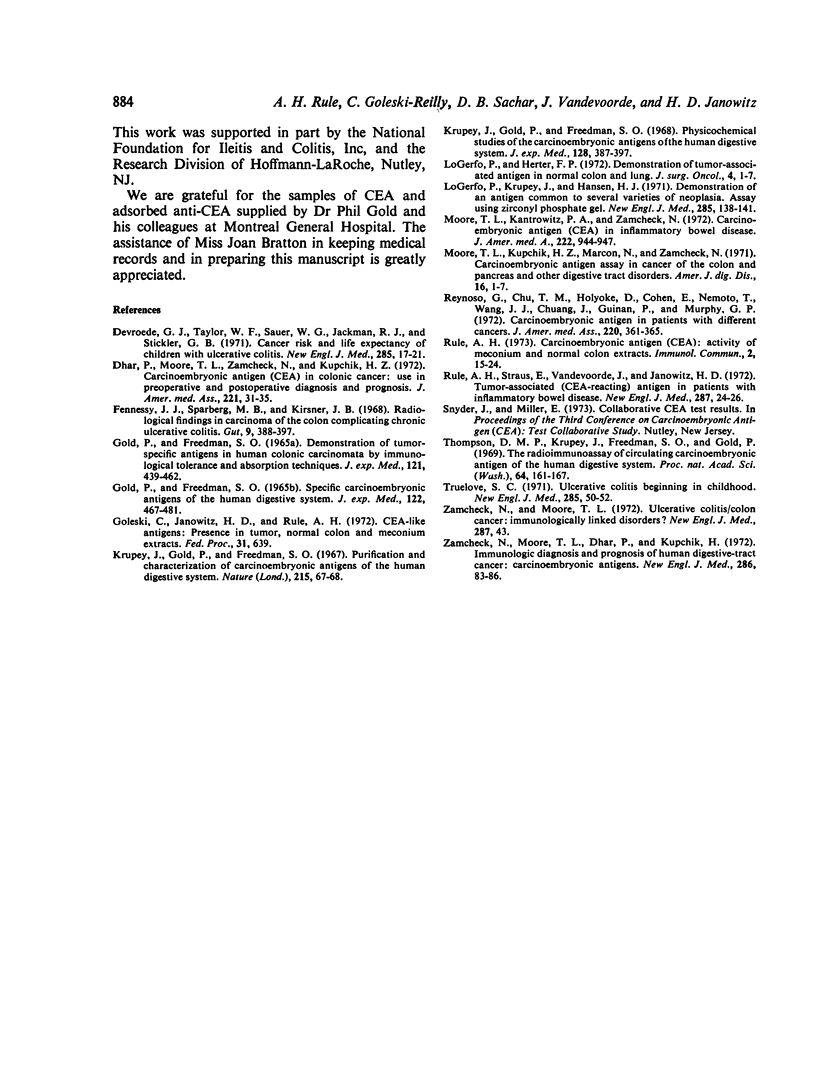
Selected References
These references are in PubMed. This may not be the complete list of references from this article.
- Devroede G. J., Taylor W. F., Sauer W. G., Jackman R. J., Stickler G. B. Cancer risk and life expectancy of children with ulcerative colitis. N Engl J Med. 1971 Jul 1;285(1):17–21. doi: 10.1056/NEJM197107012850103. [DOI] [PubMed] [Google Scholar]
- Dhar P., Moore T., Zamcheck N., Kupchik H. Z. Carcinoembryonic antigen (CEA) in colonic cancer. Use in preoperative and postoperative diagnosis and prognosis. JAMA. 1972 Jul 3;221(1):31–35. [PubMed] [Google Scholar]
- Fennessy J. J., Sparberg M. B., Kirsner J. B. Radiological findings in carcinoma of the colon complicating chronic ulcerative colitis. Gut. 1968 Aug;9(4):388–397. doi: 10.1136/gut.9.4.388. [DOI] [PMC free article] [PubMed] [Google Scholar]
- GOLD P., FREEDMAN S. O. DEMONSTRATION OF TUMOR-SPECIFIC ANTIGENS IN HUMAN COLONIC CARCINOMATA BY IMMUNOLOGICAL TOLERANCE AND ABSORPTION TECHNIQUES. J Exp Med. 1965 Mar 1;121:439–462. doi: 10.1084/jem.121.3.439. [DOI] [PMC free article] [PubMed] [Google Scholar]
- Gold P., Freedman S. O. Specific carcinoembryonic antigens of the human digestive system. J Exp Med. 1965 Sep 1;122(3):467–481. doi: 10.1084/jem.122.3.467. [DOI] [PMC free article] [PubMed] [Google Scholar]
- Krupey J., Gold P., Freedman S. O. Physicochemical studies of the carcinoembryonic antigens of the human digestive system. J Exp Med. 1968 Sep 1;128(3):387–398. doi: 10.1084/jem.128.3.387. [DOI] [PMC free article] [PubMed] [Google Scholar]
- Krupey J., Gold P., Freedman S. O. Purification and characterization of carcinoembryonic antigens of the human digestive system. Nature. 1967 Jul 1;215(5096):67–68. doi: 10.1038/215067a0. [DOI] [PubMed] [Google Scholar]
- Lo Gerfo P., Herter F. P. Demonstration of tumor associated antigen in normal colon and lung. J Surg Oncol. 1972;4(1):1–7. doi: 10.1002/jso.2930040102. [DOI] [PubMed] [Google Scholar]
- Lo Gerfo P., Krupey J., Hansen H. J. Demonstration of an antigen common to several varieties of neoplasia. N Engl J Med. 1971 Jul 15;285(3):138–141. doi: 10.1056/NEJM197107152850302. [DOI] [PubMed] [Google Scholar]
- Moore T. L., Kantrowitz P. A., Zamcheck N. Carcinoembryonic antigen (CEA) in inflammatory bowel disease. JAMA. 1972 Nov 20;222(8):944–947. [PubMed] [Google Scholar]
- Moore T. L., Kupchik H. Z., Marcon N., Zamcheck N. Carcinoembryonic antigen assay in cancer of the colon and pancreas and other digestive tract disorders. Am J Dig Dis. 1971 Jan;16(1):1–7. doi: 10.1007/BF02233781. [DOI] [PubMed] [Google Scholar]
- Reynoso G., Chu T. M., Holyoke D., Cohen E., Nemoto T., Wang J. J., Chuang J., Guinan P., Murphy G. P. Carcinoembryonic antigen in patients with different cancers. JAMA. 1972 Apr 17;220(3):361–365. [PubMed] [Google Scholar]
- Rule A. H. Carcinoembryonic antigen (CEA): activity of meconium and normal colon extracts. Immunol Commun. 1973;2(1):15–24. doi: 10.3109/08820137309022877. [DOI] [PubMed] [Google Scholar]
- Rule A. H., Straus E., Vandevoorde J., Janowitz H. D. Tumor-associated (CEA-reacting) antigen in patients with inflammatory bowel disease. N Engl J Med. 1972 Jul 6;287(1):24–26. doi: 10.1056/NEJM197207062870106. [DOI] [PubMed] [Google Scholar]
- Thomson D. M., Krupey J., Freedman S. O., Gold P. The radioimmunoassay of circulating carcinoembryonic antigen of the human digestive system. Proc Natl Acad Sci U S A. 1969 Sep;64(1):161–167. doi: 10.1073/pnas.64.1.161. [DOI] [PMC free article] [PubMed] [Google Scholar]
- Truelove S. C. Ulcerative colitis beginning in childhood. N Engl J Med. 1971 Jul 1;285(1):50–52. doi: 10.1056/NEJM197107012850112. [DOI] [PubMed] [Google Scholar]
- Zamcheck N., Moore T. L., Dhar P., Kupchik H. Immunologic diagnosis and prognosis of human digestive-tract cancer: carcinoembryonic antigens. N Engl J Med. 1972 Jan 13;286(2):83–86. doi: 10.1056/NEJM197201132860207. [DOI] [PubMed] [Google Scholar]
- Zamcheck N., Moore T. L. Ulcerative colitis-colon cancer: immunologically linked disorders? N Engl J Med. 1972 Jul 6;287(1):43–43. doi: 10.1056/NEJM197207062870112. [DOI] [PubMed] [Google Scholar]


